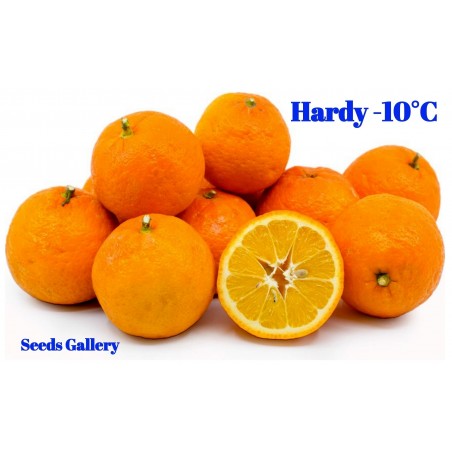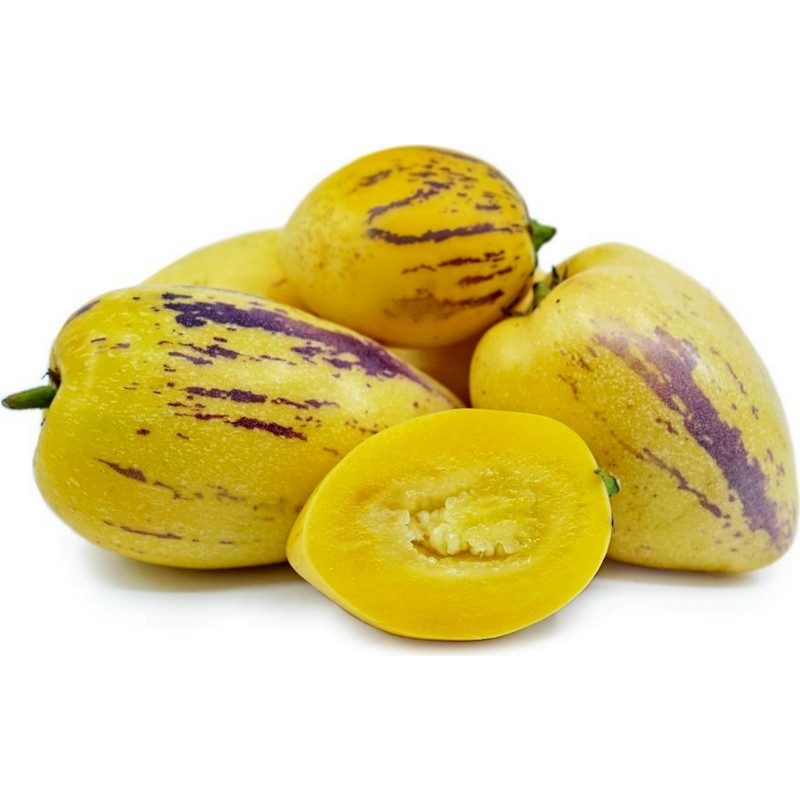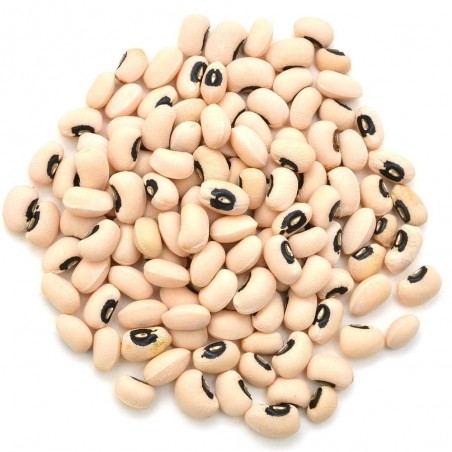
Pepino Dulce, Melon Pear Seeds (Solanum muricatum)
Pepino Dulce, Melon Pear Seeds (Solanum muricatum)
Price for Package of 5 seeds.
Solanum muricatum is a species of evergreen shrub native to South America and grown for its sweet edible fruit.
It is known as pepino dulce ("sweet pepino") or simply pepino; the latter is also used for similar species such as "S. mucronatum" (which actually seems to belong in the related genus Lycianthes). The pepino dulce fruit resembles a melon (Cucumis melo) in color, and its flavor recalls a succulent mixture of honeydew and cucumber, and thus it is also sometimes called pepino melon or melon pear, but pepinos are only very distantly related to melons and pears. Another common name, "tree melon", is more often used for the Papaya (Carica papaya) and the pepino dulce plant does generally not look much like a tree. The present species is, however, a close relative of other nightshades cultivated for their fruit, including the tomato (S. lycopersicum) and the eggplant (S. melongena), which its own fruit closely resembles.
The fruit is common in markets in Colombia, Ecuador, Bolivia, Peru and Chile, but less often overseas because it is quite sensitive to handling and does not travel well. Attempts to produce commercial cultivars and to export the fruit have been made in New Zealand, Turkey and Chile.
Distribution and habitat
The pepino dulce is presumed to be native to the temperate Andean regions of Colombia, Peru and Chile, though it is not known in the wild and the details of its domestication are unknown.Thepepino is a domesticated native of the Andes.
Cultivation
Moche clay vessel with pepino decoration (Larco Museum)
Pepinos are not often found archaeologically as they are soft and pulpy and not easy to preserve, while their tough seeds are small and easily lost among debris. But they were already described by early Spanish chroniclers as being cultivated on the coast; the Moche Valley in Peru was particularly famous for them. They were a popular decorative motif in Moche art.
In the United States the fruit is known to have been grown in San Diego before 1889 and in Santa Barbara by 1897. More commercially viable cultivars were introduced from New Zealand and elsewhere towards the end of the 20th century, leading to its introduction into up-scale markets in Japan, Europe and North America.
The pepino dulce is relatively hardy. In its native range it grows at altitudes ranging from close to sea level up to 3,000 m (10,000 ft.). However, it performs best in a warm, relatively frost-free climate. The plant can survive a low temperature of -2.5°C (27 to 28°F) if the freeze is not prolonged, though it may drop many of its leaves.[2] The species is a perennial, but its sensitivity to chilling, pests, and diseases force the growers to replant the crop every year. The crop also adapts well to greenhouse cultivation, training the plants up to 2 m tall, and obtaining yields that are 2-3 times larger than those obtained outdoors.
They are propagated by cuttings since they are established easily without rooting hormones. It is grown in a manner similar to its relatives such as the tomato, though it grows naturally upright by habit and can thus be cultivated as a free-standing bush, though it is sometimes pruned on trellises. Additionally, supports are sometimes used to keep the weight of the fruit from pulling the plant down. It has a fast growth rate and bears fruit within 4 to 6 months after planting. It is a perennial, but is usually cultivated as an annual. Seedlings are intolerant of weeds, but it can later easily compete with low growing weeds. Like their relatives tomatoes, eggplants, tomatillos and tamarillos, pepinos are extremely attractive to beetles, aphids, white flies and spider mites. Pepinos are tolerant of most soil types, but require constant moisture for good fruit production. Established bushes show some tolerance to drought stress, but this typically affects yield. The plants are parthenocarpic, meaning it needs no pollination to set fruit, though pollination will encourage fruiting.
Ripe pepinos
The plant is grown primarily in Chile, New Zealand and Western Australia. In Chile, more than 400 hectares are planted in the Longotoma Valley with an increasing proportion of the harvest being exported. Colombia, Peru, and Ecuador also grow the plant, but on a more local scale. Outside of the Andean region, it been grown in various countries of Central America, Morocco, Spain, Israel, and the highlands of Kenya. In the United States several hundred hectares of the fruit are grown on a small scale in Hawaii and California. More commercially viable cultivars have been introduced from New Zealand and elsewhere in more recent times. As a result, the fruit has been introduced into up-scale markets in Japan, Europe and North America and it is slowly becoming less obscure outside of South America. Delicate and mild-flavored, pepinos are often eaten as a fresh snack fruit, though they combine very well with a number of other fruits as well.
The study of the molecular variation of this pepino is of interest for several reasons. Although the seeds of pepino plants are fertile and produce vigorous offspring, this crop is primarily propagated by cuttings (Heiser, 1964; Anderson, 1979; Morley-Bunker, 1983), and as a consequence, its genetic structure could be different from that of seed-propagated crops.
| HEIRLOOM ? | Yes |
|---|---|
| Organic Seeds ? | Organic Seeds |
| Edible ? | Edible |
| Perennial ? | Perennial plant : Yes |
| Zbierane ręcznie nasiona? | Ręcznie zbierane nasiona |
| Manufacturer ? | Manufacturer: Seeds Gallery |
| Plant is suitable for growing ? | The plant is suitable for growing in a greenhouse The plant is suitable for growing on a balcony-terrace The plant is suitable for outdoors cultivation |
| Suitable for growing in flower pot ? | Suitable for pot: Yes |
| Plant height ? | Plant height (about) 1 m (39.3701 Inch) |
| Seeds Gallery recommend this plant ? | Seeds Gallery recommend this plant! |
| Evergreen ? | Evergreen: Yes |
| Scientific name: | Solanum muricatum |
| Sun Exposure ? | Light shade when young |
| Tree Appearance ? | Ornamental Value: Pretty |
| Type: | Fruit Seeds |
| Nazwa zwyczajowa: | Pepino Dulce |
| Planting Time? | Planting Time: Whole year-round |
| Indoor/Outdoor? | Indoor/Outdoor: Indoor & Outdoor |
| Watering? | Watering: Medium |
| Cultivating Difficulty? | Cultivating Difficulty: Very easy |


Chwilowo nie możesz polubić tej opinii
Zgłoś komentarz
Zgłoszenie wysłane
Twoje zgłoszenie nie może zostać wysłane
Napisz swoją opinię
Recenzja została wysłana
Twoja recenzja nie może być wysłana
🌍 Wysyłka na cały świat z UE
Wysyłamy zamówienia na cały świat z Unii Europejskiej za pośrednictwem poczty poleconej z potwierdzeniem odbioru.
📦 Śledzenie przesyłki
Aby śledzić przesyłkę, zaloguj się na swoje konto i przejdź do sekcji Historia zamówień > Szczegóły, gdzie znajdziesz numer śledzenia.
Śledzenie międzynarodowe: 17Track
Dla numerów takich jak RGxxxxxxHR: Śledzenie Posta.hr
🕒 Uwaga: informacje o śledzeniu pojawią się dopiero po 24 godzinach od nadania.
⚠️ Ważne uwagi
Płatność za pobraniem nie jest możliwa.
Sprawdzaj folder SPAM / Niechciane w swojej skrzynce e-mail, aby nie przegapić powiadomień.
Korzystaj wyłącznie z formularza kontaktowego na naszej stronie.
Wiadomości wysłane bezpośrednio na e-mail mogą nie zostać odebrane.
📱 Numer telefonu wymagany
Podczas składania zamówienia koniecznie podaj numer telefonu komórkowego z kodem kraju.
Przykład: +48 123 456 789
🚚 Warunki dostawy
Dla przesyłek poleconych wymagany jest podpis odbiorcy (osoby, do której adresowana jest paczka).
Nie zamawiaj, jeśli:
chcesz, aby paczka została dostarczona do skrzynki pocztowej
nie będzie Cię w domu w czasie doręczenia
chcesz, by paczka została zostawiona u sąsiada (❌ to niemożliwe)
📬 Podanie adresu skrzynki pocztowej oznacza utratę prawa do zwrotu w razie zagubienia przesyłki.
↩️ Zwrot paczki i ponowna wysyłka
Jeśli paczka zostanie zwrócona do nas z jakiegokolwiek powodu:
Pokrywasz koszt zwrotu 2 €
Oraz koszt ponownego nadania
⏱ Opóźnienia i śledzenie
Jeśli śledzenie wskazuje, że paczka wciąż jest „u nadawcy”, oznacza to, że jest w transporcie.
Skontaktuj się z lokalnym urzędem pocztowym, podając numer śledzenia.
Nie jesteśmy firmą kurierską – nie mamy możliwości monitorowania przesyłek za klientów.
Nie ponosimy odpowiedzialności za czas dostawy.
🔍 Reklamację zagubionej paczki możemy rozpocząć dopiero po 30 dniach od daty wysyłki.
✈️ Opcje wysyłki
| Typ wysyłki | Czas realizacji | Ubezpieczenie | Możliwe opóźnienie | Uwagi |
|---|---|---|---|---|
| Standardowa | 7–10 dni roboczych | ❌ | 7–14 dni | Najtańsza opcja |
| Priorytetowa | 1–7 dni roboczych | ❌ | 3–10 dni | Zamówienie przetwarzane priorytetowo, ale nie szybciej |
| Ubezpieczona | 1–7 dni roboczych | ✅ | 3–10 dni | Zwrot kosztów w przypadku zagubienia paczki (do 150 €) |
🕒 Szacowany czas dostawy:
W obrębie Unii Europejskiej: 3–20 dni roboczych
Globalnie: 5–30 dni roboczych
Przykładowe dostawy do USA: 27, 22, 19, 17, 13 dni
💳 Metody płatności
💶 Przelew bankowy (SEPA / IBAN / SWIFT-BIC)
W opisie przelewu koniecznie podaj numer zamówienia (np. SGS-19811702).
Brak opisu może spowodować opóźnienie lub anulowanie zamówienia.
Jeśli płatność nie zostanie zaksięgowana w ciągu 7 dni – zamówienie zostanie anulowane.
🅿️ PayPal
Akceptujemy płatności wyłącznie w euro.
Ustaw walutę na euro podczas płatności.
💳 Karta płatnicza
Płatności kartą odbywają się przez naszą stronę: Exotic Seeds Store
Akceptujemy: Visa, MasterCard, American Express, Diners Club, UnionPay, JCB, Discover i inne.
💡 Klient ponosi wszelkie opłaty transakcyjne.
Aby przyspieszyć realizację zamówienia, prześlij potwierdzenie przelewu.
📅 Dodatkowe uwagi
Nie przetwarzamy zamówień ani nie wysyłamy paczek w soboty i niedziele.
Przed złożeniem zamówienia sprawdź ogłoszenia na naszej stronie (np. przerwy świąteczne lub specjalne warunki).
📫 Uwaga:
Nie wysyłaj wiadomości e-mail. Używaj wyłącznie formularza kontaktowego dostępnego na naszej stronie.
Related Products

















